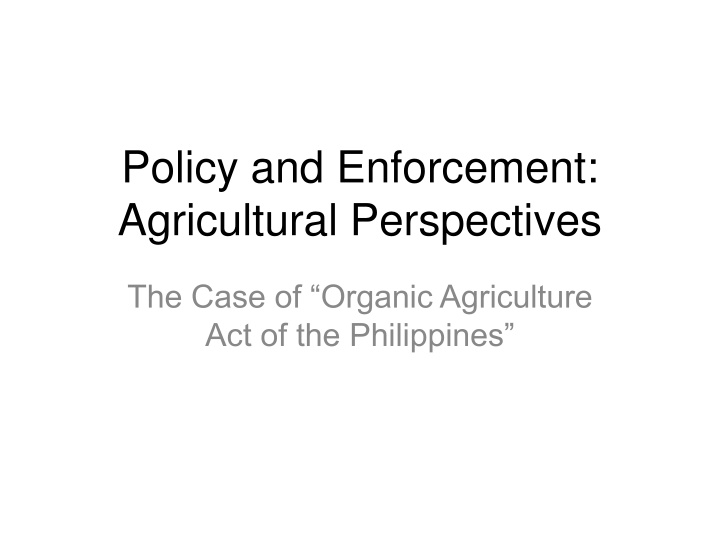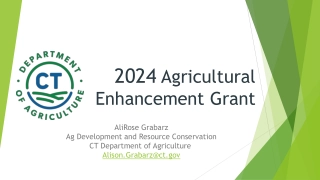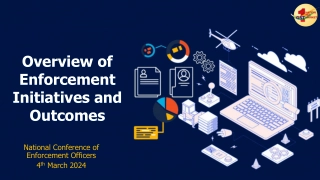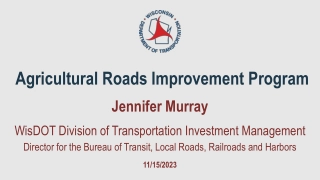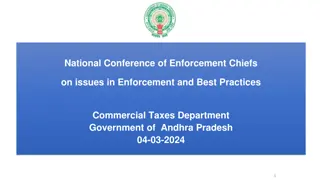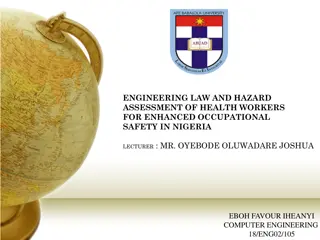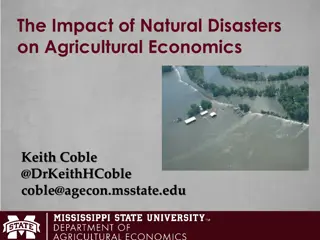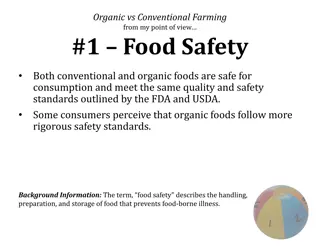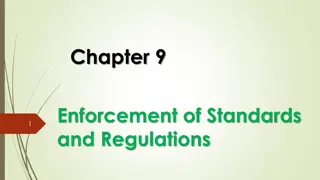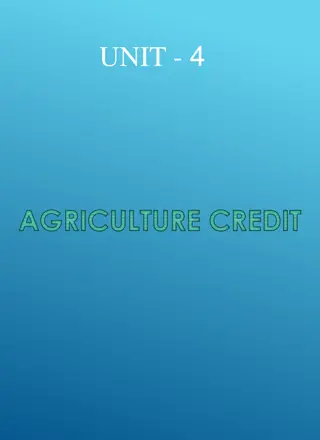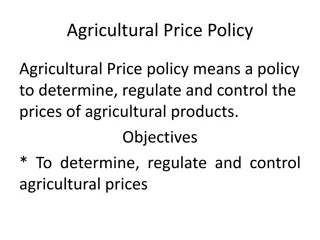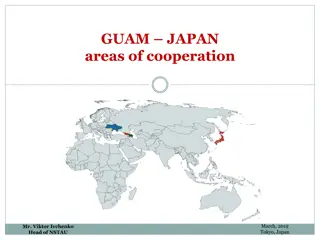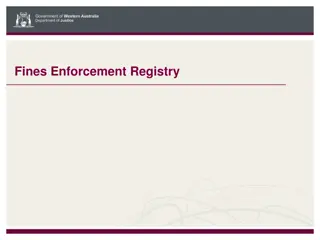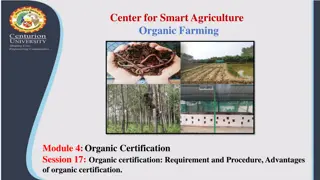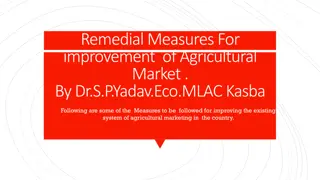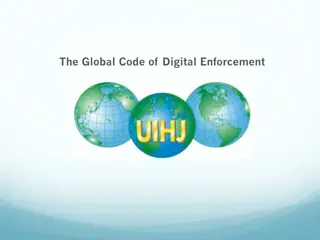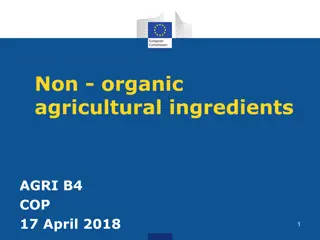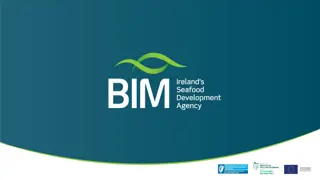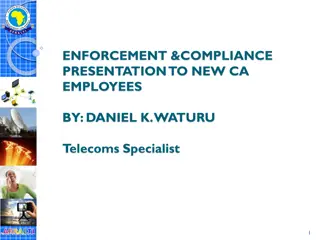Policy and Enforcement in Agricultural Perspectives: The Case of Organic Agriculture Act
This content discusses the significance of organic agriculture, updates on Philippine agriculture acts, definitions of terms, coverage under RA 10068 and RA 11511, and the creation of programs to promote and commercialize organic farming practices.
Uploaded on Feb 24, 2025 | 1 Views
Download Presentation

Please find below an Image/Link to download the presentation.
The content on the website is provided AS IS for your information and personal use only. It may not be sold, licensed, or shared on other websites without obtaining consent from the author.If you encounter any issues during the download, it is possible that the publisher has removed the file from their server.
You are allowed to download the files provided on this website for personal or commercial use, subject to the condition that they are used lawfully. All files are the property of their respective owners.
The content on the website is provided AS IS for your information and personal use only. It may not be sold, licensed, or shared on other websites without obtaining consent from the author.
E N D
Presentation Transcript
Policy and Enforcement: Agricultural Perspectives The Case of Organic Agriculture Act of the Philippines
WHY ORGANIC AGRICULTURE? Condition and enrich the fertility of the soil; Promote biodiversity; Reduce pollution and destruction of the environment; Prevent the depletion of natural resources; Protect the health of farmers, consumers and the general public; and Save on imported input
Updates on RA 10068 and RA 11511 31 Sections: Sec. 1. Title- Organic Agriculture Act of 2010 and An Act Amending RA 10068 Sec. 2. Declaration of Policy- to promote, propagate, develop further and implement the practice of orgnanic agriculture (in RA 11511, the participation of indigenous organic farmers was included) Sec. 3. Definition of Terms (14 to 24 items)- a. Organic; b. Organic agriculture; c. Organic production system; d. Conversion period; e. Biodegradable waste; f. Ecologically-sound; g. Commercialization; h. Certification; i. Accreditation; j. First party crtification; k. Second party certification; l. Third party certification; establishment; n. Organic input establishment; (apart from correction of typo errors, there are further clarifications such as in certification & accreditation. Additional terms were also defined, e.g. Inspection, organic bio-control agents, OCB, organic soil amendments, PGS, PGS group, core PGS group, POC, small farmer/fisherfolk, organic value chain) m. Organic food
Updates on RA 10068 and RA 11511 Sec. 4. Coverage- a. policy formulation or regulation, registration, accreditation, certification, and labelling; b. RDE; c. establishment of facilities, equipment and processing plants; d. Implementation of organic agricultural PAPs, including provision of support services... Sec. 5. Creation of NOAP- There is hereby established a comprehensive organic agricultural promotion and commercialization of organic farming practices, cultivation and adoption of production and processing methods..., continuing research upgrading...capacity building of farmers & education of consumers, extension of assistance to LGUs, POs, NGOs & other stakeholders including individuals and groups...and documentation and evaluation of the program s PAPs: a) OALP, b) PGS, c) Capacity Development, d) Research for Development, e) Scholarship, f) Community Seedbank, g) Marketing, h) Social Credit, i) Policy Development, and j) Advocacy and Promotion. program through the
Updates on RA 10068 and RA 11511 Sec. 6. Creation of NOAB-... Shall be the policy-making body and shall provide direction and general guidelines for the implementation of the NOAP. The NOAB shall be attached to the DA. (not yet fully implemented. In practice since the NOAP-NPCO is under DA-OSEC, the NOAB does not exist as attached but is rather under the DA.) Sec. 7. Composition of the NOAB- a. DA; b. DILG; c. DOST; d. DENR; e. DepEd; f. DAR; g. DTI; h. DOH; i. 3 reps from small farmers; j. NGO; k. SUCs; l. agribusiness (in RA 11511, DENR and DepEd were removed, TESDA, reps from PGS, IPs and organization of LGUs were added; given the complication of selection from IP for its rep, the NCIP currently seats as NOAB representing the IPs) Sec. 8. Organization of the NOAB- (in RA 11511, a quarterly meeting of the NOAB was specified; fully complied) Sec. 9. Powers and Functions of the NOAB- (no changes)
Updates on RA 10068 and RA 11511 Sec.10. The BAFPS The BAFPS of the DA shall be strengthened and empowered in terms of establishing functional divisions and incremental staffing to serve as the national technical and administrative secretariat of the NOAB with the member agencies providing additional staff support as the need arises. (repealed in RA 11511 and replaced with the creation of the NOAP-NPCO, to serve and the planning and administrative secretariat of the NOAB and as the coordinating office of the Program. At present the DBM has approved 21 plantilla for NOAP-NPCO.) Sec. 11. Functions and Duties of the BAFPS (repealed in RA 11511. A new section 12 was inserted after the new section 11 on the functions of BAFS. The BAFS of the DA shall be restructured, strengthened and empowered to support the objectives of this Act. It shall provide technical assistance to the NOAP-NPCO DBM did not approve the staffing proposal of BAFS yet).
Updates on RA 10068 and RA11511 Sec. 12. Workplan (renumbered as section 11. Transferred to NOAP-NPCO from BAFPS. NOAP-NPCO and DA-RFOs are assisting LGUs in the preparation of the S-M-L terms plans pertaining to the development of organic agriculture in their respective jurisdictions). Sec. 13. Organic Agriculture and Protection of the Environment- The NOAB shall constantly devise and implement ways and means not only of producing organic fertilizers and other farm inputs and needs on the off farm but also of helping to alleviate problems of industrial waste and community garbage disposal The BAFPS shall conduct continuing studies...on the collection and disposal of garbage...(renumbered to Section 15. NOAP, through the BSWM established CFBW, SSCF and vermisheds nationwide. With regards to the mandate of BAFS, discussion on their proposed activities will soon be conducted).
Updates on RA 10068 and RA11511 Sec. 14. PGS The PGS shall be the mechanism by which small farmers/fisherfolk, their farms/associations/cooperatives shall be certified as engaged in organic agriculture and as producers of organic agriculture products. The participatory organic certification from a government agency or OCBs, organized in accordance with this Act, shall be promoted and accepted. The products certified through the PGS shall be traded only in the domestic market, unless covered by an international certification or agreement (new section inserted. NOAP promotes and supports the formation of PGS groups in collaboration with different DA agencies. ATI conducts of trainings and specialist training course. BAFS facilitates PGS certification. NOAP also provides incentives to PGS-OCBs). a mutual recognition
Updates on RA 10068 and RA11511 Sec. 14. Local Executive Committees- Every provincial governor shall form a provincial technical committee Every municipal mayor shall likewise...An LGU that intends to shift its area of responsibility to OA must ensure that local industries have consulted...(renumbered to section 16 and retitled as Local Executive Concerns , amended to include the concept of local organic seed centers in order to increase farmers adoption to irganic agriculture. The municipalities and cities are also enjoined to enact ordinances that shall protect organic farming zones and organic farming practices. NOAP- NPCO has drafted a template ordinance to assist LGUs in the crafting of their local ordinances. NOAP-NPCO is also doing an information caravan to explain the Program, including the assistance that are available for LGUs and other stakeholders. Moreover, NOAP proposed for the amendment of SGLG to include organic agriculture among the governance areas and now crafting the guidelines for the OA special award for LGUs with significant contribution in OA promotion and program implementation). been adequately informed and
Updates on RA 10068 and RA11511 Sec. 15. Accreditation of OCB The BAFPS is hereby designated and authorized to grant official accreditation to OCB or entity The BAFPS is tasked to formulate the necessary rules and procedures in the accreditation of OCB: Provided, that there shall be at least 1 accredited OCB each in Luzon ,Visayas and Mindanao or in case of only 1 ocb is accredited, it shall have at L,V,M.(renumbered to sec. 13 and amended: BAFPS is replaced with BAFS ; the concept of PGS-OCB is included. NOAP-NPCO is following-up accreditation system for entities such as the national organization of LGUs, private group or organization actually engaged in organic agriculture, as adirect farm producer, as a promoter/advocate of the methods and principles of organic agriculture, or as a marketer of organic agriculture produce). 1 least satellite office in BAFS on alternative
Updates on RA 10068 and RA11511 Sec. 16. Registration of Organic Food and Organic Inputs Producers- All organic food and input establishments must register with the director of BAFPS (repealed and replaced with a new section 17. Instead of BAFS doing all the registrations of organic produce, products and inputs, registration is assigned to the ff: a. BAFS = integrated organic farms and organic inputs such as soil amendments and organic bio-control agents; b. BPI = organic seeds, planting materials and crops; c. BAI = organic apiculture farms, livestock and poultry and feeds; d. BFAR = organic fisheries and aquaculture resources and aquaculture feeds; e. FDA = product registration of processed foods. To date, only BAFS has an established system of registration and is submitting reports to NOAB.)
Updates on RA 10068 and RA 11511 Sec. 17. Labelling of Organic Produce The label of the organic produce shall contain the name, logo or seal of the OCB and the accreditation number issued by BAFPS. Only 3rd party certification is allowed to be labelled as organically produced.(renumbered to section 18 and amended. Products which are certified and guaranteed by Third-Party and PGS are allowed to be labelled and sold as organic. Sec. 18. Retailing of Organic Produce- Retail establishments or stores of organic produce shall designate a separate area to display the organic produce to avoid mixing it with non-organic produce (renumbered to section 19.)
Updates on RA 10068 and RA 11511 Sec. 19. Availability of Trading Post for Organic Inputs- LCEs shall establish at least 1 trading post for organic inputs (repealed. A new section (20) on Market Development and Trade Promotion is inserted. NOAP implemented various projects in relation to this mandate: a) OALP to provide financial assistance, b) establishment of OTPs, c) conduct of exhibit to showcase organic produce and products, d) profiling and registration of various agri-fishery enterprises and e) establishment of database of suppliers and buyers. With regard to AMAS, to date, they are still lost on how to implement this given that no additional funds is given to them.
Updates on RA 10068 and RA11511 Sec. 20. RDE - The Bureau of Agricultural Research (BAR) shall coordinate with other agencies of the DA, DAR, DOST, DepEd, DILG, SUCs, including private organizations, to develop, enhance, support and consolidate activities and related technologies for the formulation and implementation of a unified and integrated organic agriculture RDE plans and programs from the national to the field level... (renumbered to section 21. BAR funds research studies on both basic and applied research, and research and development facilities on organic agriculture) Sec. 21. Creation of Organic Agriculture RDE Network An organic agriculture RDE network shall be organized by the BAR, composed of research and educational institutions, LGUs, non-government agencies and the recognized association of organic fertilizer manufacturers and distributors, agricultural engineers, agriculturists, soil technologists, farmers group and/or associations (renumbered to section 22.)
Updates on RA 10068 and RA11511 SEC. 22. RDE Centers. National, regional and provincial organic R&D and extension centers shall be organized, established and integrated as a major component of the existing RDE centers of the DA, the DOST, the DENR, SUCs and the LGUs. These will be strengthened and enhanced to spearhead the integrated program to develop and promote organic agriculture throughout the country (renumbered to section 23). SEC. 23. Organic Agriculture in the Formal and Non-formal Sectors. The National Government, through the DepED and in coordination with concerned government agencies, NGOs and private institutions, shall strengthen the integration of organic agriculture concerns in school curricula at all levels (renumbered to section 24. NOAP supports the establishment of organic farms in public schools).
Updates on RA 10068 and RA11511 SEC. 24. Incentives The government shall extend incentives for the production and propagation of organic farm inputs by maximizing their use in all government and government-supported agricultural production, research and demonstration programs. Incentives shall also be provided to farmers whose farms have been duly certified as compliant to the Philippine National Standard (PNS). Further, the DA may give cash reward in recognition of the best organic farm in the country (renumbered to section 25).
Updates on RA 10068 and RA11511 SEC. 25. Appropriations The sum of Fifty million pesos (Php50,000,000.00) and the existing budget for the promotion of organic farming of the DA is hereby appropriated for the initial year of implementation of this Act. Thereafter, such amount as may be necessary for the continuous operation of the NOAB and the implementation of the program shall be included in the annual General Appropriations Act (GAA) (renumbered to Section 26 and amended the initial 50 million pesos budget of the Program to 1 billion annual allocation under the President s program of expenditure for submission to and approval of the Congress with the following allocation:) 35% for shared facilities (PAEF); 25% for seeds development/planting materials and animals distribution and feed for aquaculture, soil amendments and bio-control agents (PSS); 20% for extension and training (ESETS); 5% for small scale irrigation system (INS); and 5% for research and development (R&D) For FY 2023, NOAP s approved budget is Php900 million. The remaining 5% allocation each for socialized credit and marketing and promotion were not included for this year s budget proposal of ACPC and AMAS.
Updates on RA 10068 and RA11511 Sec. 26. Penal Provision Any person who willfully and deliberately: (a) obstructs the development or propagation of organic agriculture (b) refuses without just cause to extend the support and assistance (c) mislabels or claims that the product is organic when it is not in accordance with the existing standards for Philippine organic agriculture or this Act (renumbered to Section 27 and amended with additional provision under item C specifying sanctions for any OCB that will be found to have issued a certification to a farm or producer established to be not compliant with any of the PNS for organic agriculture or with the provisions of the Act).
Updates on RA 10068 and RA11511 Sec. 27. Implementing Rules and Regulations The NOAB shall adopt rules and regulations to implement the provisions of this Act within ninety (90) days from the effectivity of this Act and submit the same to the COCAFM for review and approval. In the drafting of the implementing rules and regulations, the DOF shall be consulted in connection with the tax incentives provided under Section 24 hereof (renumbered to Section 28 and amended. Review and approval of the COCAFM for the IRR was omitted). SEC. 28. Annual Report. The NOAB shall render an annual report to both Houses of Congress on the accomplishment of the program. A review on the viability of the program shall be made by the concerned agencies after three (3) years of its implementation (renumbered to Section 29.
Updates on RA 10068 and RA11511 Sec. 29. Congressional Oversight Committee The COCAFM shall be the congressional oversight committee for purposes of this Act. The COCAFM shall review and approve the implementing rules and regulations of this Act (renumbered to Section 30). SEC. 30. Separability Clause. If any provision of this Act is declared invalid or unconstitutional, the other provisions not affected thereby shall remain in full force and effect (renumbered to Section 31). SEC. 31. Repealing Clause. All laws, presidential decrees, executive orders, presidential regulations or parts thereof contrary to or inconsistent with this Act are hereby repealed or modified accordingly (renumbered to Section 32). proclamations, rules and
